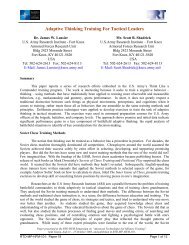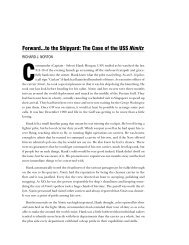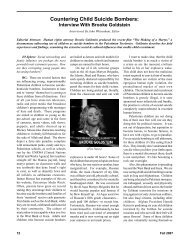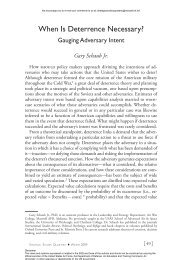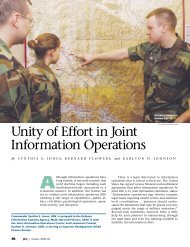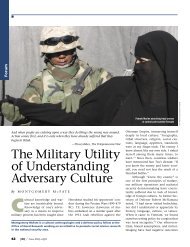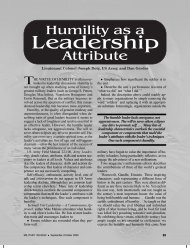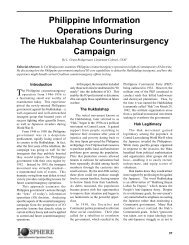Socioeconomic Roots of Middle East Radicalism
Socioeconomic Roots of Middle East Radicalism
Socioeconomic Roots of Middle East Radicalism
Create successful ePaper yourself
Turn your PDF publications into a flip-book with our unique Google optimized e-Paper software.
RICHARDS 23<br />
dimensions. However important the socioeconomic and political aspects <strong>of</strong> this<br />
crisis, the cultural difficulties are equally, perhaps uniquely, important. While<br />
these dimensions are conceptually distinct, they are also intimately linked, and<br />
they interact in complex ways. For example, economic failure erodes regimes’ legitimacy<br />
and fosters an ideological vacuum, as old ideologies (e.g., Arab nationalism)<br />
are perceived as failures. The <strong>of</strong>ten-noted fact that essentially all serious<br />
political discourse in the region is now phrased in Islamic terms links the cultural<br />
dimension to all the others.<br />
This crisis is simultaneously internal and external. It is internal because <strong>of</strong><br />
population growth, failed economic policies, local authoritarianism, and cultural<br />
issues. It is external because wider forces <strong>of</strong> globalization play a critical role<br />
in stimulating the growth and spread <strong>of</strong> radicalism. Much <strong>of</strong> the region’s economic<br />
stagnation derives from its weak and distorted integration into the global<br />
economy. At the same time, the kinds <strong>of</strong> integration that have occurred—specifically,<br />
international migration and the spread <strong>of</strong> global communications—have<br />
themselves contributed to the spread <strong>of</strong> radicalism. Also, in large part, the failure<br />
<strong>of</strong> local regimes stems from a failure to manage and engage successfully the<br />
wider process <strong>of</strong> globalization. 1<br />
Today’s <strong>Middle</strong> <strong>East</strong> finds itself mired in the “modernization process.” The<br />
transition from a society <strong>of</strong> illiterate farmers, ruled by a literate, urban elite, into<br />
an urban, mass-educated society with an economy based on industry and services<br />
has been deeply traumatic. Worse, such change has always and everywhere<br />
spawned grotesque violence. The modern history <strong>of</strong> both Europe and <strong>East</strong> Asia,<br />
the only places in the world where this transition has been more or less successfully<br />
accomplished, <strong>of</strong>ten reads like a horror novel: World Wars I and II, Stalin’s<br />
Gulag, Hitler’s Holocaust, Japanese fascism, the Chinese revolution, the “Great<br />
Leap Forward” and its attendant famine, and the Cultural Revolution. The<br />
American experience has also been bloody: the extermination <strong>of</strong> Native Americans,<br />
the racial violence <strong>of</strong> slavery and Jim Crow, and the more than half-million<br />
casualties <strong>of</strong> its own Civil War. Why should we expect the people <strong>of</strong> the <strong>Middle</strong><br />
<strong>East</strong> to do better than anyone else?<br />
Much <strong>of</strong> the violence during this transition has been perpetrated by utopian<br />
fanatics, a category that includes fascists, Nazis, Leninists, and Maoists, and the<br />
followers <strong>of</strong> al-Qa‘ida. Like their predecessors, today’s Islamic fanatics “imagine<br />
a future” in the “restoration” <strong>of</strong> the (imagined) conditions <strong>of</strong> seventh-century<br />
Arabia. Like all fanatics, they believe that they enjoy a monopoly on truth and<br />
that those who disagree “are not merely mistaken, but wicked or mad.” 2 They believe<br />
that there is only one goal for humanity, and to reach it they are ready to<br />
wade “through an ocean <strong>of</strong> blood to the Kingdom <strong>of</strong> Love.” 3 Fanatics have always<br />
built towers <strong>of</strong> skulls as monuments to their fantasies.



